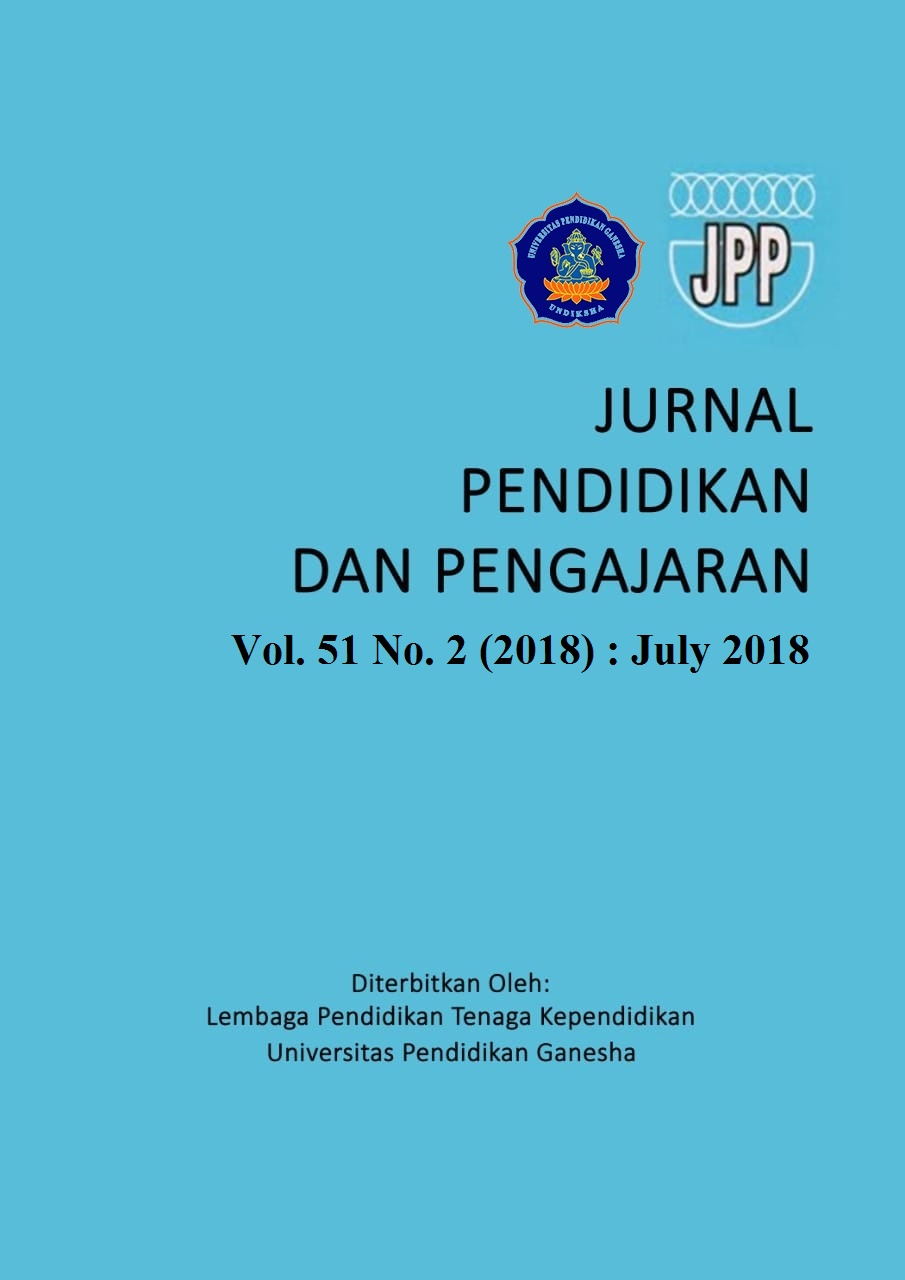Implementation of cooperative learning model type Jigsaw in social science to increase students’ learning outcome
DOI:
https://doi.org/10.23887/jpp.v51i2.15415Kata Kunci:
cooperative learning, Jigsaw, learning outcomeAbstrak
This study aimed at improving learning outcome in social science using cooperative learning model type Jigsaw in social science. The model was implemented in a primary school. This learning model was developed into 2013 curriculum-based learning. We conducted the study into cycle 1 and cycle 2, each consisted of 3 meetings. The research subjects were 4th grade students. The research design was arranged based on planning, action, and reflection. Results show that there is an increase in the number of students passing the minimum requirement. Therefore, Jigsaw can improve students’ learning outcomes.Referensi
Asis, B. (2013). Meningkatkan hasil belajar IPS dengan menggunakan model pembelajaran kooperatif tipe Jigsaw pada siswa kelas IV SDN 1 Gimpubia. JURNAL DIKDAS, 1(3).
Astiti, D. K. S., & Widiana, I. W. (2017). Penerapan Metode Pembelajaran Jigsaw Sebagai Upaya Meningkatkan Hasil Belajar IPA Pada Siswa Kelas IV SD. Jurnal Ilmiah Sekolah Dasar, 1(1), 30–41.
Dewi, Y. A. (2017). PPenerapan model kooperatif tipe Jigsaw untuk meningkatkan hasil belajar IPS siswa kelas V. BASIC EDUCATION, 6(8), 831–839.
Elmi, B., Marmawi, R., & others. (2013). Penggunaan Model Pembelajaran Kooperatif Tipe Jigsaw Dalam Pembelajaran IPS Untuk Meningkatkan Hasil Belajar. Jurnal Pendidikan Dan Pembelajaran, 3(6).
Johnson, D. W., Johnson, R. T., & Stanne, M. B. (2000). Cooperative learning methods: A meta-analysis.
Komalasari, K. (2010). Pembelajaran kontekstual konsep dan aplikasi. Bandung: Refika Aditama.
Mukminatun, S. (2009). Upaya meningkatkan hasil belajar ipa melalui pembelajaran kooperatif model jigsaw pada siswa kelas IV sd Negeri 12 Sragen tahun pelajaran 2009/2010. Skripsi Universitas Sebelas Maret Surakarta.
Pontoh, H., Jamaludin, J., & Hasdin, H. (n.d.). Penerapan Model Pembelajaran Jigsaw Untuk Meningkatkan Hasil Belajar Ilmu Pengetahuan Sosial (IPS) Siswa Kelas V SD Inpres Salabenda Kecamatan Bunta. Jurnal Kreatif Tadulako Online, 4(11).
Rahmawati, L. (2010). Penerapan Model Pembelajaran Jigsaw untuk Meningkatkan Hasil Belajar Siswa dalam Pembelajaran IPS Kelas III B SDN Karangsari 3 Kota Blitar. SKRIPSI Jurusan Kependidikan Sekolah Dasar & Prasekolah-Fakultas Ilmu Pendidikan UM.
Rejeki, N. E. S. (2009). Meningkatkan Hasil Belajar Matematika Melalui Model Pembelajaran Kooperatif Tipe Jigsaw Pada Siswa Kelas Viii G Semester 2 Smp Negeri 2 Toroh Grobogan. Media Penelitian Pendidikan: Jurnal Penelitian Dalam Bidang Pendidikan Dan Pengajaran, 3(2).
Slavin, R. E. (1990). Cooperative learning: Theory, research, and practice. Prentice-Hall.
Solihatin, E., & others. (2007). Cooperative Learning Analisis Model Pembelajaran IPS. Jakarta: Bumi Aksara.
Tewksbury, B. J. (1995). Specific strategies for using the “Jigsaw” technique for working in groups in non-lecture-based courses. Journal of Geological Education, 43, 322–326.
Trianto. (2010). Mendesain Model Pembelajaran Inovatif-Progresif: Konsep, Landasan dan Implementasinya pada kurikulum Tingkat Satuan Pendidikan (KTSP). Jakarta: Kencana.
Walker, I., & Crogan, M. (1998). Academic Performance , Prejudice , and the Jigsaw Classroom : New Pieces to the Puzzle. Journal of Community & Applied Social Psychology, 8, 381–393.
Widiastini, M., Kusmariyatni, N., & Arini, N. W. (2014). Keefektifan model pembelajaran kooperatif tipe jigsaw untuk meningkatkan hasil belajar IPS Siswa kelas V. MIMBAR PGSD Undiksha, 2(1).
Unduhan
Diterbitkan
Cara Mengutip
Terbitan
Bagian
Lisensi
Authors who publish with Jurnal Pendidikan dan Pengajaran agree to the following terms:- Authors retain copyright and grant the journal the right of first publication with the work simultaneously licensed under a Creative Commons Attribution License (CC BY-SA 4.0) that allows others to share the work with an acknowledgment of the work's authorship and initial publication in this journal
- Authors are able to enter into separate, additional contractual arrangements for the non-exclusive distribution of the journal's published version of the work (e.g., post it to an institutional repository or publish it in a book), with an acknowledgment of its initial publication in this journal.
- Authors are permitted and encouraged to post their work online (e.g., in institutional repositories or on their website) prior to and during the submission process, as it can lead to productive exchanges, as well as earlier and greater citation of published work. (See The Effect of Open Access)





